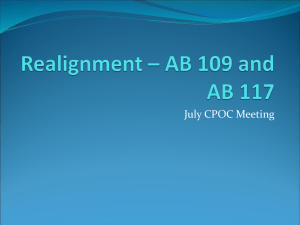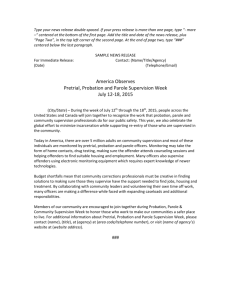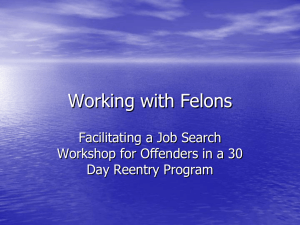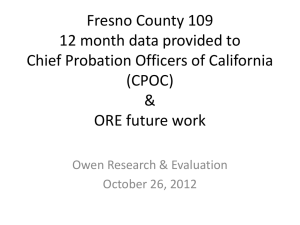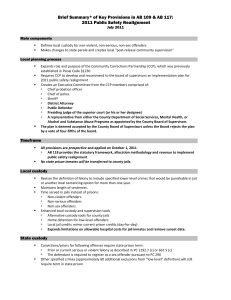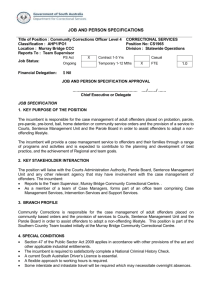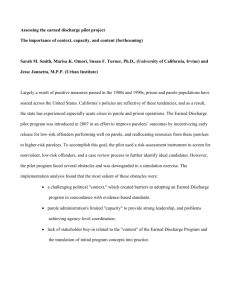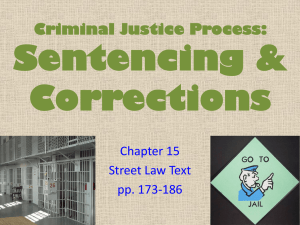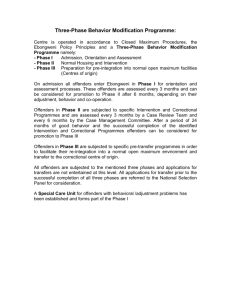2 - San Joaquin County
advertisement
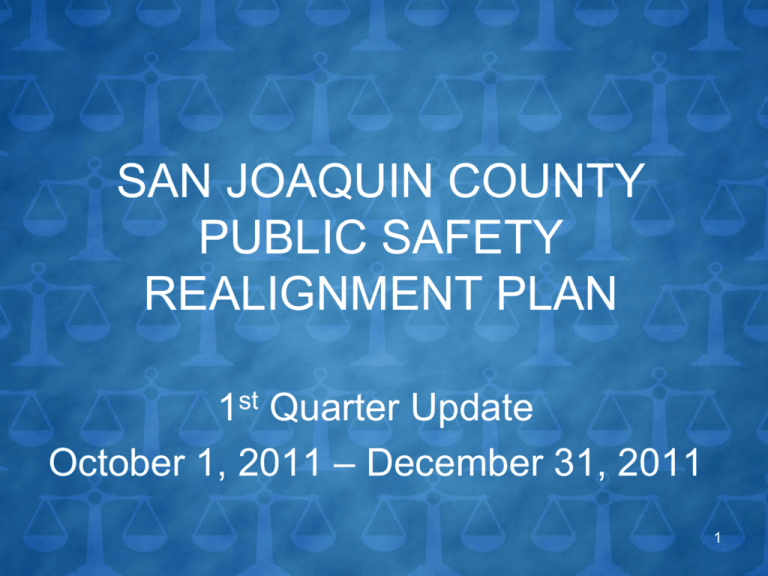
SAN JOAQUIN COUNTY PUBLIC SAFETY REALIGNMENT PLAN 1st Quarter Update October 1, 2011 – December 31, 2011 1 Brief History • The Executive Committee of the Community Corrections Partnership approved the first year plan on August 22, 2011. • Executive Committee Membership - Patricia Mazzilli, Chief Probation Officer - Peter Fox, Public Defender - Steve Moore, Sheriff - Vic Singh, Director, Behavioral Health Services - Blair Ulring, Chief of Police, Stockton Police Department - Honorable Richard Vlavianos, Superior Court Judge - James Willett, District Attorney • The Board of Supervisors approved the Public Safety Realignment Plan on August 30, 2011. • Public Safety Realignment went into effect on October 1, 2011 2 AB109 Populations • Non-violent, non-serious, non-sex offenders (irrespective of prior convictions) released from prison placed on Post Release Community Supervision (PRCS) • Non-violent, non-serious, non-sex offenses with no serious prior serve their sentence locally in the County Jail (LCS) • Parole violators (3056’s) serve their revocation at the County Jail 3 AB109 Flow Chart for San Joaquin County LCS from the Courts PRCS from State Prison Assessment Center Parole Violators County Jail County Jail Intake, assessment, screening Behavioral Health Services Human Services Agency WorkNet Medical services Incarceration (split or straight sentence) Jail programming Correctional Health Services Parole Hold (3056’s) 3056 with new law violation Community Supervision Other Referrals and Components High Risk Unit Day Reporting Center Family and Youth Services SJCOE (via DRC, Jail, YouthBuild) Evidence Based Programming Completion of Probation New Law Violation and Revocation Return to court GPS/EM Flash Incarceration Released from Jail Released from Jail Straight sentence (no supervision) Split sentence o Assessment Center Re-Entry and Compliance Court State Parole Community Supervision (Substance Abuse) Jail 4 Local Community Supervision (LCS) • Non-violent/non-serious/non-sex offenders sentenced locally after October 1st October November December TOTAL Straight Sentences 21 25 14 60 Split Sentences 44 31 30 105 Total 65 56 44 165 • Average length of sentence is 3 years • Longest sentence is 8 years 5 LCS’s Projections/Concerns • CDCR estimated 87 more offenders would be sentenced to Jail under the new sentencing guidelines in the first quarter; the actual number (165) was almost double. Quarter 1: Local Custody Supervision N = 165 LCS released from Jail 1 Returned for new law violation 0 Returned for technical violation 0 Most LCS’s are still serving initial sentence Post Release Community Supervision (PRCS) • County level supervision for offenders released from State Prison • Includes: • Current non-violent and non-serious offenders • Sex offenders (excludes high risk sex offenders as defined by California Department of Corrections and Rehabilitation) • Does not take prior convictions into consideration 7 PRCS Projections • As with the original LCS estimates from CDCR, original PRCS estimates underestimated actual impact October November December TOTAL Spring Projections 88 68 52 208 Revised Projections 70 94 113 277 • Revised estimates projected an increase of 33% • In actuality, we have had 317 scheduled to appear at the Assessment Center during the first quarter (a 52% increase). 8 PRCS Indicators Quarter 1: Post Release Community Supervision Arrested for new law violation 4 Flash incarceration for technical violation 0 PRCS’s Issues/Concerns • Early packets received by CDCR had numerous issues including ineligible offenders and packets that were issued to the wrong county. These have improved significantly. • The spring projections provided by CDCR did not include parole violators sentenced to State Prison prior to October 1, 2011. When released after November 1st, they are on PRCS. • This population of parole violators should be completely released from the State Prison system by September 2012. 10 PRCS’s • All PRCS’s are directed to report to the Assessment Center within 48 hours of being released from State Prison October November December TOTAL Scheduled for Prison Release 87 110 120 317 Appeared at Assessment Center 71 85 91 247 Initially Failed to Report 4 12 7 23 Revocations filed for Initially FTR 4 11 5 20 • The difference in number of those scheduled, appeared, and failed to report are a result of a number of reasons (i.e. deportation, in custody, parole has jurisdiction, outof-county) 11 Program Highlight Assessment Center • Located in Room 101 of the Canlis Building • Four partner agencies co-located in same office: • Probation Department • Behavioral Health Services • Human Services Agency • WorkNet 12 Prison Jail CDCR 611 Pocket San Joaquin County Probation Department Assessment Center Re-Entry Assessment Form Send reporting instructions to CDCR County Jail Static Risk Assessment (STR) Office appointment Offender needs Guide Review conditions of Community Supervision Mandatory program referrals (DV, child abuse, sex offenders) Make Assessment Center Referrals Bus passes Behavioral Health Services Worknet Assign to appropriate program DRC (18-25) High Risk Unit (Everything else) Human Services Agency Transitional Housing Post Supervision Release Re-Entry Unit (Substance Abuse) 13 Probation Department • Validated risk assessment to determine risk to reoffend • Validated needs assessment to determine offender’s criminogenic needs • Development of case plan identifying offender’s individual needs • Determine appropriate level of supervision/program • Refer to evidence based programs • Refer to supportive services to assist offender in his/her reintegration back into the community and provide necessary resources to assist in their rehabilitation 14 Behavioral Health Services • BHS provides mental health and substance abuse services for clients diagnosed with mental illness and/or dependency issues • Comprehensive Counseling • Case Management • Peer Supports • Acute Care Services • Substance Abuse Services • Outpatient Mental Health Treatment • Crisis Response and Stabilization 15 Human Services Agency • Eligibility workers screen clients for eligibility for: • General Assistance • CalFresh (food stamps) • CalWORKS • Medi-Cal • If screening shows potential eligibility, the screener will complete a General Assistance application 16 Employment and Economic Development Department • WorkNet provides a variety of education, training, and employment services to help clients obtain and retain employment in living wage jobs • Services provided: • Orientation classes • Employment Preparation Workshops • Interviewing and Resume Writing • Labor market information • Job Search Assistance • Access to a computer lab • Classroom/occupational skills • On-the-Job Training 17 Assessment Center • 209 offenders appeared at Assessment Center • 77 referred to Behavioral Health Services • 66% of PRCS offenders referred completed a mental health assessment • 48 PRCS offenders with diagnosed mental illnesses were given prescriptions to continue their psychotropic medications • • • • • 152 referred to Human Services Agency 111 referred to WorkNet 14 referred to the Day Reporting Center 161 referred to the High Risk Unit 9 referred to the Post Release Supervision Reentry Court 18 Assessment Center Accomplishments • Multi-agency, intense collaboration between all partner agencies • Assessment Center fully operational with four agencies co-located in the same building • A fully functioning computer lab is available to all offenders Monday – Friday from 8:00 a.m. – 5:00 p.m. • WorkNet has offered 16 workshops with a total of 78 offenders in attendance • HSA has screened 40 homeless offenders; all but one qualified for General Assistance Housing 19 Parole Violators • After October 1, 2011, parole violators remain at the County Jail pending their revocation hearing • Revocations are capped at 180 days with day-for-day credits earned • In the spring projections, CDCR estimated there would be 14 parole violators with a new term in the first quarter. • To date, this population has been the most significant challenge of Public Safety Realignment. October November December TOTAL Number of 3056’s (parole holds) In Custody 154 154 179 487 Number of Probable Cause Hearings 87 120 154 361 Number of Revocation Hearings 9 0 0 9 20 Parole Violator Indicators Parole Violators Remanded to San Joaquin County Jail Released from County Jail 220 Returned to custody with new criminal charges 79 Returned to custody for other reasons 48 County Jail • Opened 210 beds for AB109 offenders • A 124-bed housing unit has been designated as the PreRelease Housing Unit, for offenders with less than 6months remaining in custody • The average daily population of the Pre-Release Housing Unit has been: Pre-Release Housing Unit October November December 102 85 72 22 In-Custody Programs • Offered 7 days a week to AB109 offenders in the PreRelease Housing Unit • • • • • • • • Women to Warriors Faith-Based Programs GED classes Pre-Release Anger Management Job Readiness Office Technology Narcotics Anonymous Library Activities for Women Real Recovery High School Diploma Transitional Life Skills Creative Conflict Resolution HIV Counseling and Testing Parenting Alcoholics Anonymous 23 Out-of-Custody Evidence Based Programs • Aggression Replacement Training --13 offenders have attended two different series • Moral Reconation Training --24 offenders have attended two different series • Common Sense Parenting (scheduled for February) • Upcoming Trainings • Women Moving On (training scheduled in March) • Cognitive Behavioral Interventions for Substance Abuse (training scheduled in April) 24 Alternatives to Incarceration • In-Custody • 72 offenders have been placed on Electronic Monitoring in lieu of being incarcerated at the County Jail • Out-of-Custody • The Probation Department is utilizing a Rewards/Sanctions Matrix which provides alternatives to incarceration in lieu of recommending jail. • 1 PRCS offender has been placed on Global Positioning Satellite (GPS) for a technical violation in lieu of being incarcerated at the County Jail 25 First Quarter Accomplishments • Strong, committed collaboration between all partner agencies • San Joaquin County was one of the first counties in the State to have the Public Safety Realignment Plan approved • Our plan was used as a model for various statewide organizations • San Joaquin County has made significant progress in implementing all plan components and is much farther along than most counties in the State • Monthly Bulletin highlights core data elements and provides updates on activities 26 First Quarter Accomplishments (cont.) • State Parole is an active partner in San Joaquin County’s CCP, which is not the case throughout the State • A Parole/County Committee has been formed to develop processes for sharing information and working together to promote public safety • The Assessment Center is fully functional and is the hub for supportive services for offenders being released from custody • The County Jail was expanded by 210 beds • Correctional Health access to BHS electronic health record on emergency or as needed basis 27 First Quarter Accomplishments (cont.) • The Probation Department’s Day Reporting Center has been expanded • Numerous evidence based programs are being offered in-custody and out-of-custody at no charge to offender • Expenditures are being spent as planned 28 First Quarter Challenges • AB109 Population is higher than projections upon which the plan was developed • Data collection is more difficult than originally anticipated • Challenges including working on common definitions, formalizing record keeping policies, and connecting data from different systems. • Parole violators are primarily being court capped for technical violations. Coupled with that fact, the longest they can be revoked for is 180 days (with day-for-day credit), there are negligible consequences for not abiding by parole conditions. 29 Next Steps • • • • • • • • Improve data collection for consistency of reporting Agree on a local definition for defining recidivism Further analyze make-up of County Jail population Bring on additional treatment providers for residential, out-patient, and sober living environments Secure contracts for 45-day transitional housing for homeless offenders who do not qualify for general assistance housing Increase utilization of community service as a sanction Brainstorm a solution in dealing with parole violators Develop Year 2 plan once funding allocation has been finalized 30
